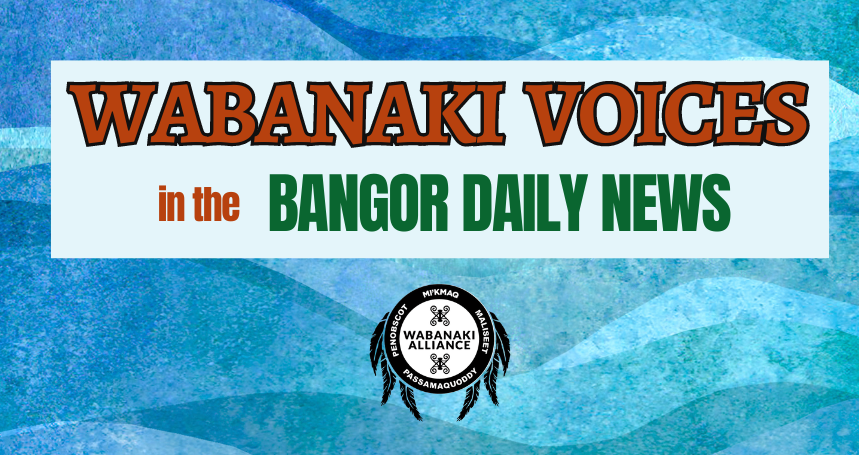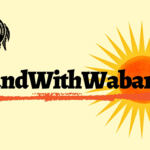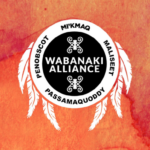The May Wabanaki Voices column was written by Donna Loring and Donald Soctomah. Loring served in the Women’s Army Corp as a communications specialist at Long Binh Army Base from 1967-1968 and represented the Penobscot Nation in the Maine Legislature from 1998-2003 and again 2007-2008. Soctomah represented the Passamaquoddy Tribe in the Legislature from 2006-2010, serves as the Tribal Historic Preservation Officer for the Passamaquoddy Tribe, and founded the Passamaquoddy Cultural Heritage Museum. Wabanaki voices is a monthly column in the Bangor Daily News opinion section that shares tribal perspectives. Read all Wabanaki Voices columns here.
The Wabanaki Confederacy, which includes the Penobscot, Passamaquoddy, Maliseet, Mi’kmaq, and Abenaki Tribes, has a long and storied history of military service. Wabanaki warriors have consistently demonstrated our valor and commitment. Nonetheless, our contributions are often overlooked and rights denied as we sacrificed our lives in defense of our homeland.
Wabanaki warriors allied with the American colonists beginning in 1775, bringing our extensive knowledge of the land and formidable combat skills to the struggle for independence.
On June 21, 1775, Chief Joseph Orono (Donna Loring’s seventh generation great-grandfather) addressed the Penobscot warriors just before they were to participate in the American Revolution with these words:
The Great Spirit gives us freely all things.
Our white brothers tell us they came to Indian country to enjoy liberty and life but a Great Sagamore is coming to bind them in chains, to kill them. We must fight him for should he bind them in bonds, next he will treat us like bears. He will tear away from us Indian liberties and land.
We must help his ill-treated sons for they will return good for good and the law of love runs through their children…
Look down the stream of time. Look up to the Great Spirit.
Be kind, be valiant, be free, then are the Indians sons of Glory!
With these words the Penobscot warriors marched off to fight for right and freedom.
In all the wars since, we can tell you what we fought for as Wabanaki veterans. As Chief Orono said over 200 years ago, should the revolutionaries lose, they would be bound in chains and we Native people treated like animals. We fought to protect our land, our freedom, and our way of life and yes, we even fought to protect this country because what happens to the country happens to us only that much worse.
We have taken part in every war that America has fought, from the Revolutionary War, the Civil War, the Spanish American War, World War I, World War II, the Korean War, Vietnam, the Gulf War, Somalia, the War in Afghanistan, and the Iraq War.
Though our warriors answered the call to defend the U.S., legislators acted to deny our rights. When the U.S. declared war on Japan on Dec. 7, 1942, the Maine 91st Legislature convened its Research Committee to streamline costs because of the war. One of the items this committee focused on was the cost of treaty obligations to the Tribes. According to the Legislative Research Committee (LRC) Final Report and Transcripts for 1941-42, this body discussed how to cut the cost by eliminating Tribal members and extinguishing the Tribes. Among its proposals was to introduce blood quantum, the amount of “Indian blood” that an individual possesses, to characterize individuals concerning their citizenship status.
LD 694, “An Act Relating to Loss of Membership in Indian Tribes by Marriage” was submitted for approval by the LRC to the Legislature and it passed with an amendment stating that not only would women lose their rights if they married white, but men would lose their rights if they married a white woman. They talked about a long-term plan to do so. All this while Wabanaki men and women were at war, putting their lives on the line fighting for freedom.
According to Passamaquoddy historical records, in 1942, there were 57 Passamaquoddy men between the ages of 18 -35. Out of that number 34 were in military service in September of 1944. Consider the criminality that at this very time in 1942 this Legislative committee made plans to eliminate Tribal members and commission a study with an eye towards dissolving the Tribes. The study was published in 1942 titled the Proctor Report.
Following World War II, Wabanaki people joined the fight during the Korean War. Former Tribal Governor John Stevens, the Passamaquoddy longest serving Tribal leader, spoke of his time in Korea. According to records, he said, “They were marching through a Korean village, and he looked at the faces of the young kids and they reminded him of home. Then he noticed the bellies of the starving kids and it reminded him of his own childhood on the reservation.”
These wars allowed Wabanaki veterans like us to see our lives through a much larger lens. We instantly recognized the significant challenges we faced upon returning home. When we returned after World War II we were not allowed to vote or to utilize veterans benefits. We returned home to the same repressive conditions we left before the war. Despite all the negatives, there was something of great value we got from the wars and that was loyal comrades we would later tap for their expertise in the law and for help in our quest to survive as Tribal nations.





